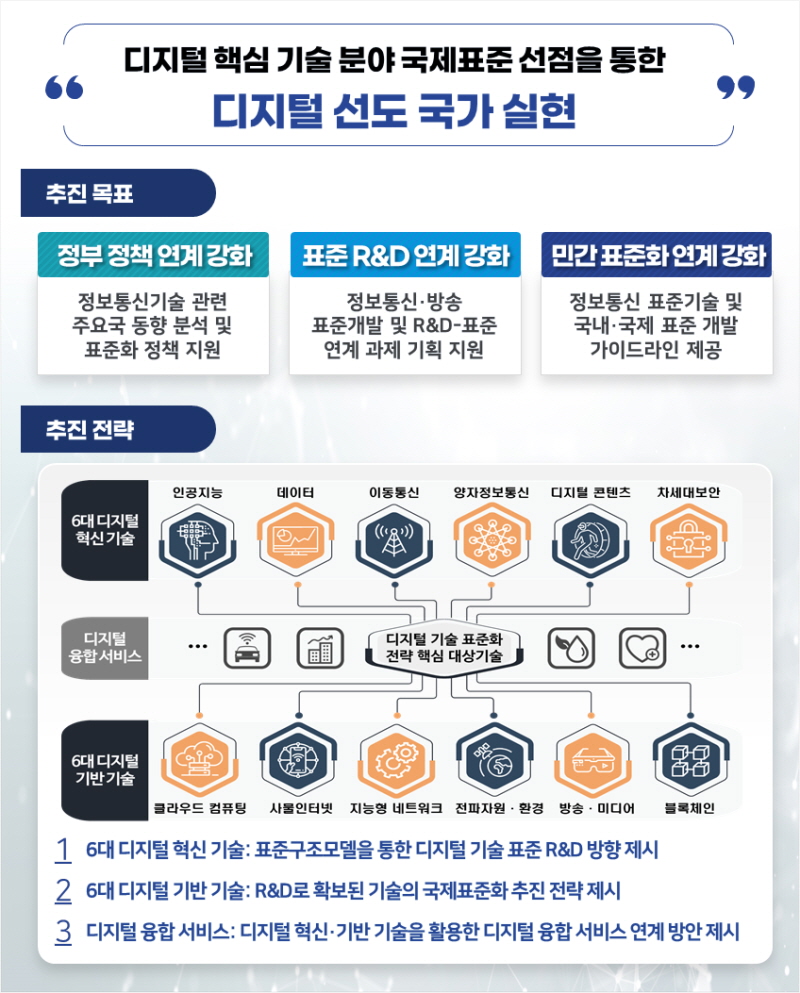정부가 인공지능, 데이터, 6G, 차세대 보안 등 12대 디지털 혁신 기술의 표준화를 본격 추진하며, 글로벌 기술 패권에 적극 대응한다.
글로벌 기술 패권 본격 대응, 국제 경쟁력 강화
정부·민간 표준 연구개발 방향 제시 로드맵 수립
정부가 인공지능, 데이터, 6G, 차세대 보안 등 12대 디지털 혁신 기술의 표준화를 본격 추진하며, 글로벌 기술 패권에 적극 대응한다.
과학기술정보통신부(장관 이종호)는 표준을 중심으로 정부 정책, R&D, 산업·서비스를 연계해 미래 기술 주도권 확보를 위한 종합 추진 방향을 담은 ‘디지털 기술 표준화 전략’을 수립했다고 10일 밝혔다.
최근 국가 간 기술 패권 경쟁의 주요 승부처로 표준 선점이 급부상함에 따라 주요국은 국가 표준 정책을 수립하고 표준화 지원을 강화하는 등 표준을 국제 경쟁력 강화를 위한 전략 자원으로 활용하고 있다.
우리나라도 한-미 차세대 핵심·신흥 기술 대화(2023년 4월 신설)와 같은 협의체를 통해 동맹·우방국과 국제표준화를 포함한 협력을 강화하고, 디지털 심화 시대의 보편적 디지털 질서 규범인 디지털 권리장전(2023년 9월)을 발표하는 등 국제사회의 디지털 경제질서 구축에 적극적으로 참여하고 있다.
이에 올해 표준화 전략은 우리나라가 국제표준화 협력의 중심축 역할을 할 수 있도록 핵심 기술 분야에 대한 표준 연구개발과 확보된 기술의 국제표준화 추진 전략을 제시했다.
핵심 기술 분야는 경제·안보적 측면에서 표준 선점이 중요할 뿐 아니라 우리나라가 선도할 수 있는 기술로 국가 기술 육성 정책과 연계, 표준 활성도, 전문가 평가 등 국내외 ICT 표준 현황 분석을 토대로 선정된 이동통신(6G), 인공지능(AI), 양자정보통신, 차세대보안 등 12개 기술 분야다.
각 핵심 기술 분야는 추진 목적과 우리나라의 표준화 수준에 따라 디지털 혁신 기술과 디지털 기반 기술로 유형화하고 맞춤형 전략을 수립했다.
구체적으로, 디지털 혁신 기술의 표준화 추진을 위해 표준구조모델을 도입하여 선제 대응이 필요한 75개의 표준화 대상 기술을 선정했고, 기술 성숙도에 따라 △R&D 추진 △R&D-표준R&D 동시 추진 △표준 R&D 추진 기술로 분류하여 정부·민간의 표준 연구개발 방향을 제시하는 로드맵을 수립했다.
디지털 기반 기술에서는 시장·기술·표준의 SWOT 분석을 통해 R&D로 확보한 기술의 국제표준 선점을 위한 81개 중점 표준화 항목을 선정했고, 국제표준화 진행 단계에 따라 △차세대 공략 △선도경쟁 공략 △추격/협력 공략 △지속/확산 공략 △전략적 수용으로 분류해 국제표준화 전략을 제시하는 전략맵을 수립했다.
이와 더불어 12대 핵심 기술을 활용하는 국내·국제 서비스 표준을 분석하여 12대 디지털 융합 서비스 분야를 도출하였고, 디지털 융합 서비스 표준 활용 방안을 제시하는 활용맵을 추가로 개발했다.
과기정통부와 한국정보통신기술협회(회장 손승현, TTA)는 지난 3월부터 12개 핵심 기술 분야별 산·학·연 표준화 및 기술개발 전문가 189명이 참여하는 기술표준 분과위원회를 구성하고, 총 92회에 걸친 회의를 통해 표준화 전략을 마련했다.
표준화 전략은 차년도 ICT 표준개발 및 연구개발 과제 기획을 위한 기반 자료를 제공함으로써 기술개발과 표준화 간 연계를 강화하고, ‘표준화 기획 - 기술개발 및 표준개발 과제 반영 - 표준 성과 검증’에 이르는 표준화 전주기 추적 관리를 통한 선순환 체계 구축에도 활용할 계획이다.
과기정통부 전영수 정보통신산업정책관은 “표준은 세계 시장 선점의 전략적 수단이자 기술개발 결과물의 사업화 성패를 가르는 핵심 동인”이라며 “급변하는 국제표준 선점 경쟁에서 우리가 선택·집중해야 할 표준화 대상 발굴, 기술개발과 연계, 표준특허 확보, 글로벌 협력 방안 등 치밀한 계획을 설계하고, 이에 따른 전략적 투자와 국제표준화 무대에서 선제적 활동이 무엇보다 중요하다”고 밝혔다.
본 보고서는 11월7일부터 TTA 홈페이지(www.tta.or.kr)을 통해 공개될 예정이다.

▲디지털 기술 표준화 전략 비전 및 목표
